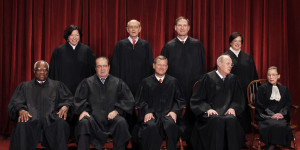 On Monday, the Supreme Court rule that companies that were closely held cannot be required to cover the payment of some types of employee contraceptives. The court ended the term with a narrow political and legal setback for a highly controversial part of the healthcare reform measure by President Obama.
On Monday, the Supreme Court rule that companies that were closely held cannot be required to cover the payment of some types of employee contraceptives. The court ended the term with a narrow political and legal setback for a highly controversial part of the healthcare reform measure by President Obama.
By a decision of 5-4, the conservatives on the high court essentially made a ruling that some for profit companies have religious rights.
The Hobby Lobby, Conestoga Wood Specialties, a furniture maker and Mardel a Christian bookseller, had argued that Obama’s Affordable Care Act violated their First Amendment rights and other laws protecting their religious freedom since it required them to give coverage for contraceptives such as the “morning after” pill which those companies consider equal to abortion.
The issue in front of the court was whether the healthcare measure could mandate the coverage of contraception specifically for certain types of businesses that objected due to religious reasons.
The part of the law that was in dispute required for profit corporations of a specific size to offer birth control insurance benefits and other health services related to reproduction without the need for co-pay.
Many businesses equate some of the drugs that are covered, such as the morning after pill as equal to causing an abortion.
The question that was presented was whether those companies could refuse on the claim it would be violating their moral beliefs.
The justices are provided a large amount of discretion in which to frame the issues and could reach a compromise through the act of narrow statutory interpretation.
The court took into consideration two appeals that were related from Hobby Lobby a retail giant in based in Oklahoma and Conestoga Wood Specialties a cabinetmaker in Pennsylvania.
Both companies emphasized the desire of operating along biblical principles while competing within a marketplace that was secular.
This presented a complex mixture of regulatory, constitutional and legal concerns over delicate issues like abortion, faith, congressional intent and corporate power.
